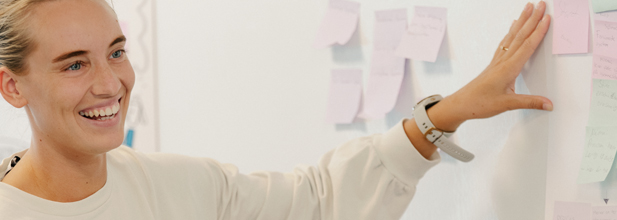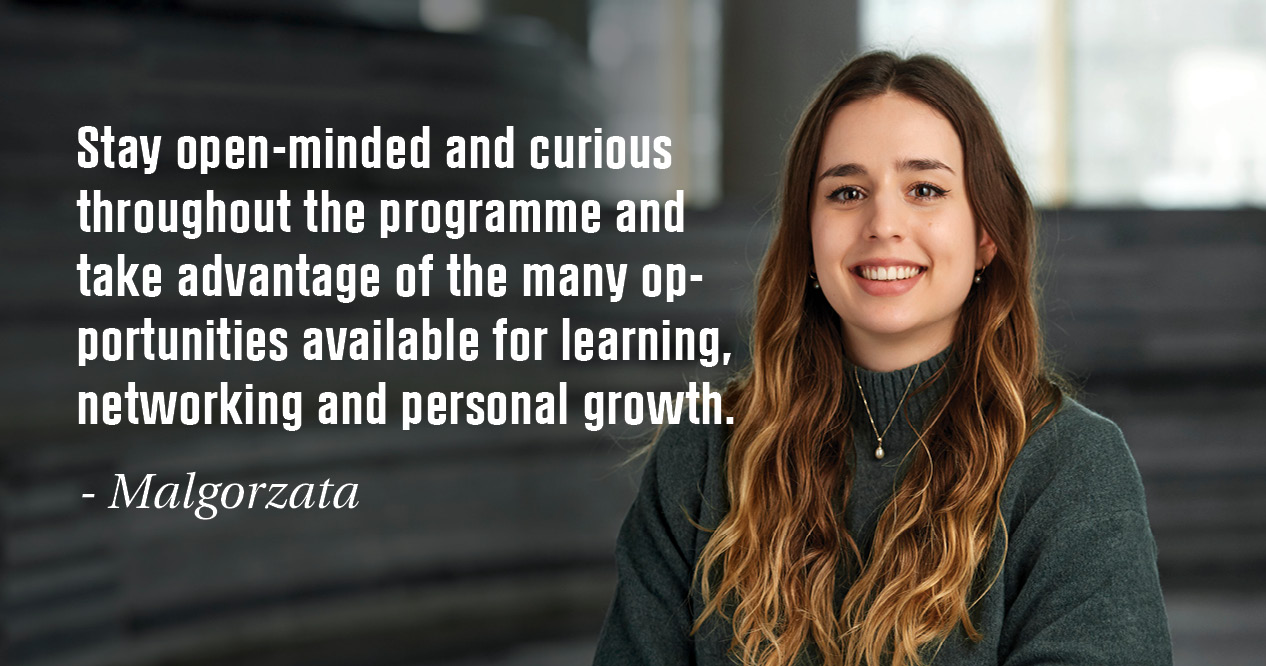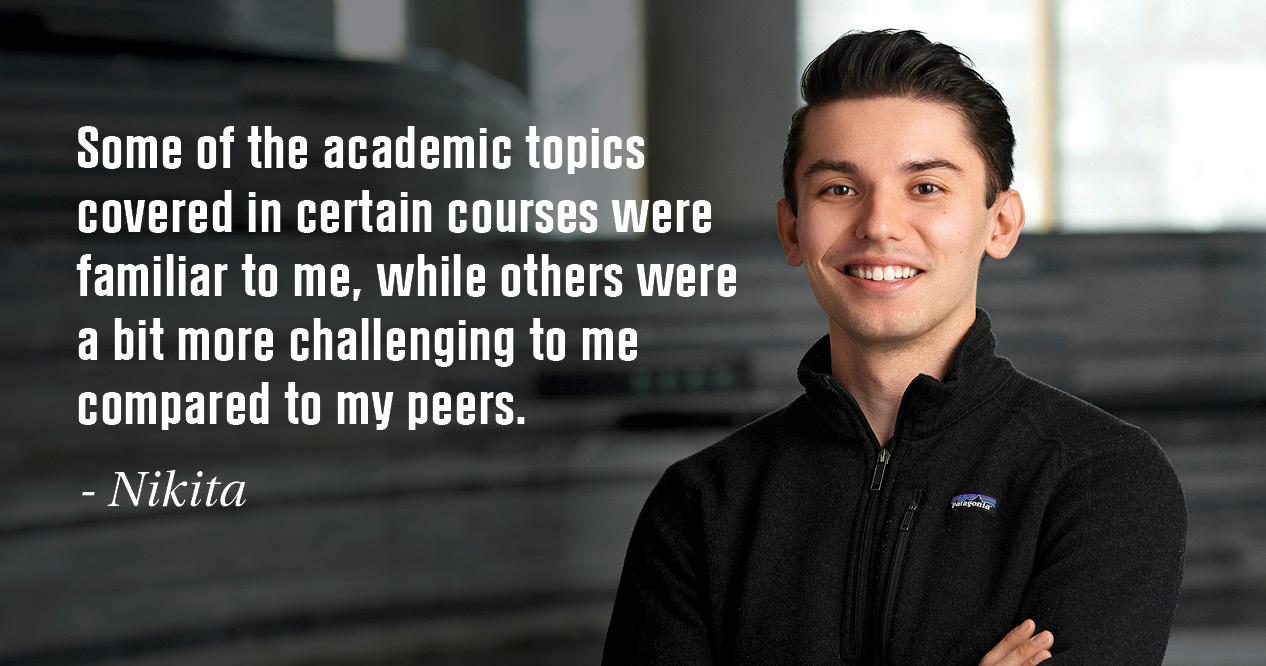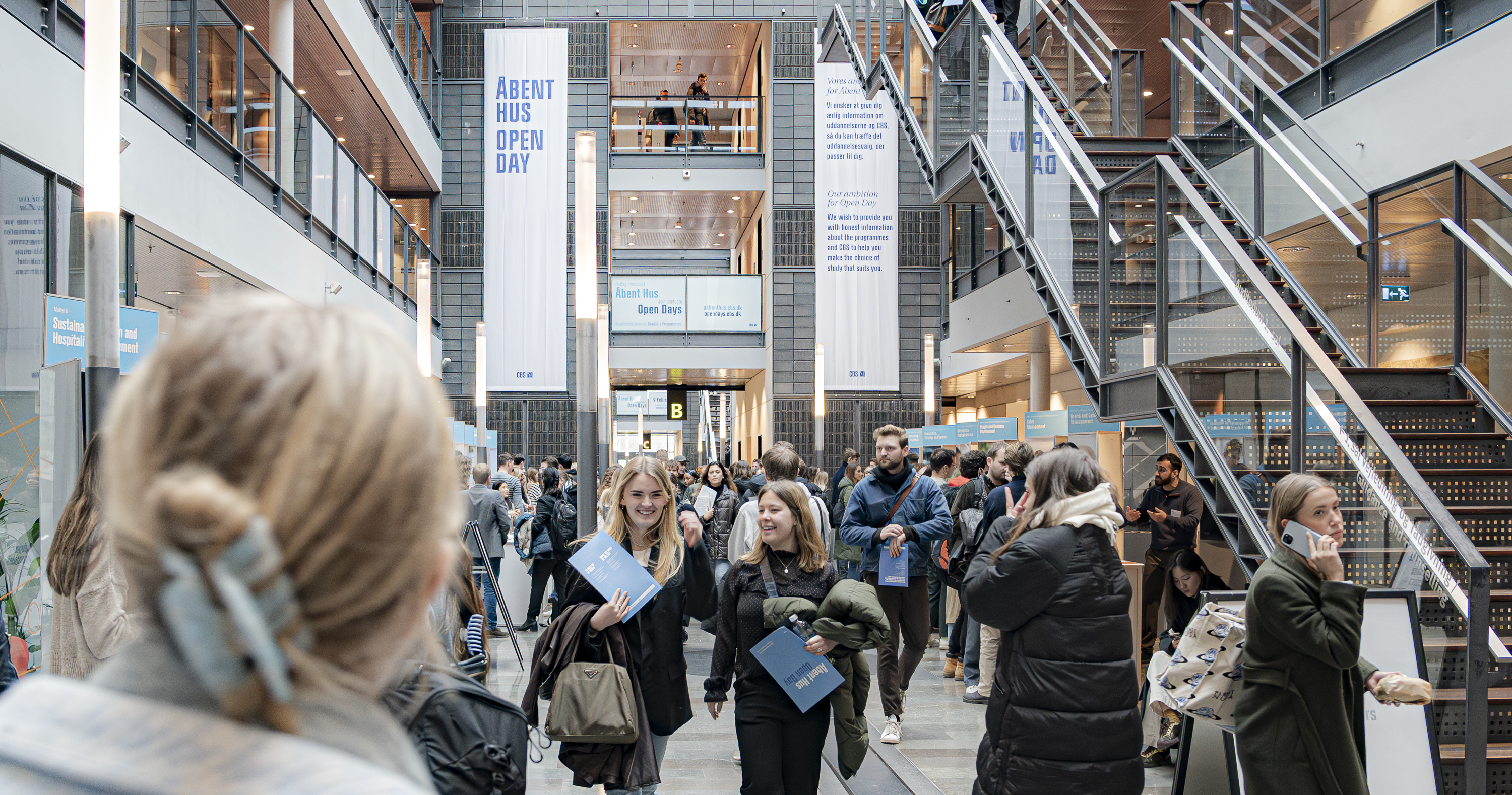MSc in Business Administration and Information Systems
About the programme
The programme combines topics of business and general management with technical topics addressing digital and information technologies of relevance for organisations.
IT at the core of business
The significance of digital and information technologies in business is greater than ever. Almost every activity and decision in a company depends on IT, and therefore IT considerations are key concerns in a range of business functions, including human resources, finance, manufacturing and security.
Companies and organisations rely on IT when pursuing their digital business aspirations, communicating with employees, suppliers and customers, and IT is used to observe changes in markets, to keep up with supply and demand, and to reduce cost and risk by collecting and analysing data and information.
In a world permeated by digital technologies, having an IT organisation that effectively contributes to organisations ambitions is not a choice, but is a necessity.
IT as a tool
In this programme you learn how to use digital and information technologies to add value to companies and organisations. We care about digital technologies, because they change what is possible. Technology is viewed as something you can use and manage to reach the goals and solve the problems of a company.
You will gain an understanding of the company and learn to analyse its needs providing the background for designing and implementing specific solutions. You will learn how IT affects the organisational structure and financial results of a company – and how the organisational needs and economic reality creates possibilities and constraints on the IT organisation.
You will also learn how to box in the problems of a company – reducing the complexity and making it possible to analyse, create and implement IT solutions. And you will learn to think outside the box – and thereby not only find more effective ways of doing things but also create new solutions to old problems.
Speaking two languages
The dependence of companies and organisations upon digital and information technology creates a need for technical and non-technical-departments to understand and collaborate with each other – and a need for employees with an understanding of the implementation of technology into business. Employees with skills restricted to either business administration or computer science is no longer sufficient. Companies need people with qualifications that cross the boundaries of the two different areas.
You work with the integration of non-technical and technical matters and gain experience and knowledge of the two fields, their intersections and different needs, possibilities and constraints.

Customise your programme
During the programme, you have various opportunities to create your own academic profile.
Electives
On the 3rd semester, you can choose to study courses of your specific interest. CBS offers a large number of electives within a wide range of topics. You can also choose to take electives at other Danish universities. The electives you choose have to be relevant for your programme.
See the current selection of CBS electives on Single courses and electives - Master
Minor
On the 3rd semester, you can also choose to study a so-called minor. A minor is a package of electives within a specific academic area. Typically, it consists of 3 courses. By taking a minor, you strengthen your competences within a specific area of interest, and you can use it to qualify for specific jobs or industries.
See the current selection of CBS minors on Minors
Exchange
Many students choose to go on exchange on their 3rd semester; usually at one of CBS’ more than 300 partner universities. When you go on exchange through CBS, you do not have to pay for the teaching at the foreign university (with a few exceptions), and you can bring your SU (student grant).
Find a list of all CBS partner universities here
Academic internship
You can choose to replace some of your electives with a so-called academic internship. The academic internship consists of an internship period at a company, which is then completed with a project report. You can do the internship at a company in Denmark or abroad.
When doing an internship you get the opportunity to relate theory to practice and reflect on the academic training you receive at CBS in a practical setting. Therefore, the project report and work assignments during your internship have to be relevant to your study programme.
Double Degree
On MSc IT, you can apply for a double degree with Mannheim Mannheim Business School. As a double degree student, you get a degree from both CBS and Mannheim Business School.
For the 1st year of your programme, you will study at CBS and for the 2nd year at Mannheim Business School in Germany. This way, you achieve a degree and a diploma from both CBS and Mannheim Business School in Germany.
Learn more about Double Degree
Learn more about Double Degree with Mannheim Business School in Germany
Master's thesis
Your 2nd year is completed with a master's thesis. You choose the topic you want to write about, which allows you to focus on a specific topic of your interest. Typically, you write your master's thesis with a fellow student.
What to consider
Unboxing technology
This programme is designed to progress an advanced understand of digital and information technology. While we do care about technology per see, but because it changes what is possible for organisations and organization of work, we still seek to unbox the digital technologies to fully comprehend their transformative impact.
This requires a fundamental familiarity with digital technologies, but more importantly a willingness and interest to engage with how digital technologies actually work and how the properties that we want to harness in organisations are constituted. The readings, conversations and discussions we have are designed from the assumption that students have at least a basic understanding of topics such as programming and IT systems and a willingness to further engage in the unboxing of technology.
Engaging in society
Because we are addressing the transformational impact of technology, we throughout the programme frequently engage with broader society through seminars, guest lectures, workshops and course projects. In many courses it is an expectation to engage with case organisations in group work through projects that forms the basis for exams.
Studying in English
If you do not have a bachelor’s degree taught in English, we recommend that you read more about what to consider before applying for an English taught programme.
Study environment
We seek to foster social and professional interactions within the programme and across related programmes at CBS. You will be part of a growing community of technology-oriented study programmes at CBS which creates additional opportunities for fostering a study context of personal and professional value.
BIT-LAB
BIT-LAB is a physical meeting place for students in HA(it.) and MSc in Business Administration and Information Systems to hang out, talk informally, and work on study projects.
Alumni association
There is an active alumni association which hosts events and posts new letters. This offers a chance to talk with alumni and often also companies about career opportunities.
Student life at CBS
Studying at CBS is much more than just preparing for and going to classes.
At CBS, there are more than 20,000 students with different backgrounds and nationalities. Teamwork is an essential part of studying at CBS both in classes and in extracurricular activities.
With more than 100 student organisations, you also have plenty of opportunities to engage and connect with students across programmes and classes.
Learn more about the vibrant student life at CBS, the student organisations, and the international environment on Student life
For internationals
If you are an international student, we have gathered a lot of information about what it is like to be an international student at CBS and how you can prepare for life in Denmark.
Read more on For internationals
Teaching and exams
Teaching activities take various forms including traditional large classroom lectures, workshops, hands on exercises, group work, project supervisions, discussions, and case seminars.
Generally, activities take departure in and are structure around real world problems encountered by contemporary organisations. An underlying assumption is that students are self-driven and ready to explore topics independently and in group, with the assistance and under direction of course instructors. Courses are also designed with the assumption that students have the ability to take part of on campus teaching activities and engage in exercises, group work and discussions.
The programme has emphasis on explanation, reflection and action, rather than memorisation of facts and description, and these objectives are reflected in the exam types. This includes report writing, project work and oral explanation. Many courses also include mandatory assignments which prepare you for the final exam assignment.
Teaching
Read about Teaching and working methods on Student life
Exams
Read about Exams and exams types on Student life
Time consumption
You should know that it is demanding to study in a graduate programme, and both the curriculum and workload is significantly higher than at bachelor level.
If you are studying on a full-time graduate programme, you should expect spending approximately 37 hours on average on your studies each week. The workload will vary during the year.
The time leading up to assignment submissions and exams can be hectic, and you can easily work more than 40 hours a week in this period. Preparing for oral exams can be especially time consuming, because you have to be able to explain and discuss the covered concepts and theories and learn things by heart.
Read more about Time consumption on Student Life
Student job
Most programmes are quite flexible in terms of combining studies with a student job. Most students work a maximum of 15 hours a week in order to have sufficient time for their studies.
Studying in Denmark - for internationals
If this is your first time studying in Denmark, you may find teaching and exam formats, the grading scale and the academic calendar very different from what you are used to.
Read about everything you need to know as an international student studying at CBS on For internationals > Academic information
Career
What gets you the job?
Most graduates work in the intersection between digital technologies and non-technical organisational functions. Either in IT departments, interfacing to non-technical stakeholders, in non-technical functions responsible for technical issues, in consultancies with IT or digital management our other bridging roles. These roles are in great demand on the job market, and graduates get employed in a broad spectrum of positions including consultants, analysts, project managers, and system developers.
Career opportunities
Many graduates are initially employed in junior management roles, as digital project or product managers. A large proportion of students are starting their careers in IT, digital or general management consulting. A third route includes various roles that has to do analysis, such as technical or business analysts. Many students are then progressing into senior expert or managerial roles.
Students find jobs in Danish as well as international companies both large and small. Traditionally, students have had among the lowest unemployment numbers of all Danish graduates, and the highest salaries both in short and long term after graduation.
Competence Profile
In the competence profile you can read more about the purpose of the programme and the competencies you achieve:
Competence profile for MSc in Business Adminsitration and Information Systems
Course overview
| 1. semester |
2. semester (Choose 4 out of 6 courses) |
3. semester | 4. semester | |
|
Managing IT Project Complexities (7,5 ECTS)
|
Electives / Internship / Exchange (30 ECTS)
|
|
||
| Internet of Things (7,5 ECTS) | ||||
| Artificial Intelligence and Machine Learning (7,5 ECTS) | ||||
| Innovation in a Digital World (7,5 ECTS) | ||||
| Information Economics and Business (7,5 ECTS) | ||||
| Strategy Making and Information Technology (7,5 ECTS) | Advanced Strategic Information Management (7,5 ECTS) | |||
| Applied Machine Learning (7,5 ECTS) | Researching Technologies: Explanatory and Design Strategies (7,5 ECTS) | |||
You can read more about the programme, academic content and exams in the in programme regulations for MSc in Business Administration and Information Systems.


